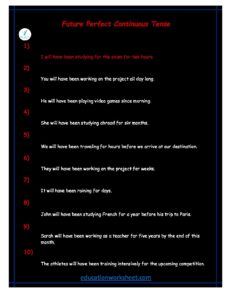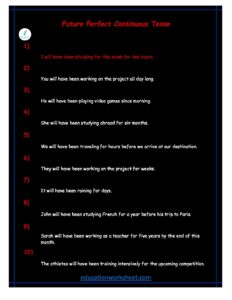how to converting Future Continuous Tense interrogative sentences to positive form
how to converting Future Continuous Tense interrogative sentences to positive form
Tense is a crucial aspect of English grammar, as it helps us convey when an action is happening in relation to the present, past, or future. The Future Continuous Tense is one such form, and it is used to express actions that will be ongoing or in progress at a particular point in the future. Interrogative sentences are those that pose a question or seek information. In this comprehensive guide, we will explore how to convert Future Continuous Tense interrogative sentences into the positive form, ensuring that you have a solid grasp of this essential aspect of English grammar.
Understanding the Future Continuous Tense:

Before we delve into converting interrogative sentences, it’s crucial to understand what the Future Continuous Tense is and how it is formed. The Future Continuous Tense is used to describe actions or events that will be in progress at a specific time in the future. It is created by using the auxiliary verb “will be” followed by the base form of the main verb and the present participle (adding “-ing” to the base verb).
For example:
- “I will be studying for my exam tomorrow.”
- “She will be cooking dinner when you arrive.”
In the context of interrogative sentences, we often use the helping verb “will” at the beginning to form questions. To convert these interrogative sentences into positive statements, we’ll simply remove the question structure while maintaining the Future Continuous Tense.
Step-by-Step Conversion:
Now, let’s break down the process of converting Future Continuous Tense interrogative sentences into positive sentences.
Step 1: Identify the Interrogative Structure Begin by recognizing the elements that make the sentence interrogative. This typically involves starting with the auxiliary verb “will” and placing it before the subject.
For example:
- “Will you be working late tonight?”
- “Will they be playing football in the park?”
Step 2: Remove the Interrogative Structure To convert these sentences into positive statements, we need to remove the interrogative structure. This means taking out the auxiliary verb “will” and moving the subject to its original position in the sentence.
Example conversions:
- “You will be working late tonight.” (Positive form)
- “They will be playing football in the park.” (Positive form)
Step 3: Keep the Future Continuous Tense Intact Ensure that the Future Continuous Tense remains intact. To do this, retain the structure where the main verb is in its base form and followed by “-ing.”
For example:
- “You will be working late tonight.” (Positive form)
- “They will be playing football in the park.” (Positive form)
Common Conversion Examples:
Let’s look at some common Future Continuous Tense interrogative sentences and convert them into positive form.
Interrogative: Will I be studying for the test tomorrow? Positive: I will be studying for the test tomorrow.
Interrogative: Will she be singing at the concert tonight? Positive: She will be singing at the concert tonight.
Interrogative: Will we be traveling to Paris next week? Positive: We will be traveling to Paris next week.
Interrogative: Will he be working on the project all day? Positive: He will be working on the project all day.
Interrogative: Will they be celebrating their anniversary this weekend? Positive: They will be celebrating their anniversary this weekend.
Usage and Context:
The Future Continuous Tense is frequently used when discussing activities or events that are expected to occur at a specific future time or over a period. These could be personal plans, work-related tasks, or any future events where the ongoing nature of the action is relevant. Converting interrogative sentences to positive form helps to assert these statements with confidence.
Interrogative: Will you be attending the conference next month? Positive: You will be attending the conference next month.
In this example, changing the interrogative form to a positive statement expresses a firm intention or plan to attend the conference.
Additional Considerations:
- When converting interrogative sentences to positive form, it’s important to make sure that the tense and subject-verb agreement are maintained correctly.
- The Future Continuous Tense may also be used in negative sentences. To convert negative interrogative sentences to positive form, remove the negation (e.g., “not”) and restructure the sentence accordingly.
how to converting Future Continuous Tense interrogative sentences to positive form


